11.30.2005 09:38
waiting
g-cubed is pretty speedy. Now waiting for
the decision... talk about detail...
Stage Start Date ===== ========== Waiting for Editor Decision 2005-11-10 10:01:17 Editor Assigned 2005-11-10 10:01:17 Waiting for Editor Assignment 2005-11-10 10:01:17 Initial Quality Control Complete 2005-11-10 10:01:16 Initial Quality Control Started 2005-11-07 18:17:25 Author Approved Converted Files 2005-11-07 18:17:25 Waiting for Author Apprv of Conv Files 2005-11-07 18:00:09 File Conversion Complete 2005-11-07 18:00:09 Waiting for File Conversion 2005-11-07 17:56:54 Manuscript Submitted 2005-11-07 17:56:54 Manuscript Files Submitted 2005-11-07 17:56:54 Preliminary Manuscript Data Submitted 2005-11-07 17:51:58
11.30.2005 07:50
Deluo mouse GPS
I just got a nice reply from Deleo
about their GPS...
Which is a basic NMEA stream... why do all these things default to 4800 baud serial? So slow. At least it is better than the KLY-2 Kappabridge in the pmag lab which only does 300 baud.
Open a new terminal window and type stty -f /dev/cu.usbserial 4800 or -f /dev/cu.usbserial0 4800 depending on whether you used usbserial or usbserial0 on the first window. On the first window that opened you will now start seeing incoming NMEA sentences which will look like this: cat /dev/cu.usbserial
$GPGGA,212333.880,4738.3090,N,12219.2978,W,1,03,03.4,00080.6,M,-18.8,M,,*55 $GPGSA,A,2,,,,10,,06,,,,24,,,03.5,03.4,*1D $GPGSV,2,1,07,17,30,238,,05,24,175,,25,18,286,,10,52,091,34*7A $GPGSV,2,2,07,06,71,302,34,24,25,058,35,30,54,202,36*45 $GPRMC,212333.880,A,4738.3090,N,12219.2978,W,000.0,000.0,090303,018.6,E*71 $GPGGA,212334.880,4738.3088,N,12219.2978,W,1,03,03.4,00080.6,M,-18.8,M,,*5B
11.30.2005 06:34
Google maps takes lat,lon
Yeah! I don't have to break out GMT,
Fledermaus, or Arc. Google Maps takes longitudes and latitudes. Now
I can find that suspended sediment station quicker.
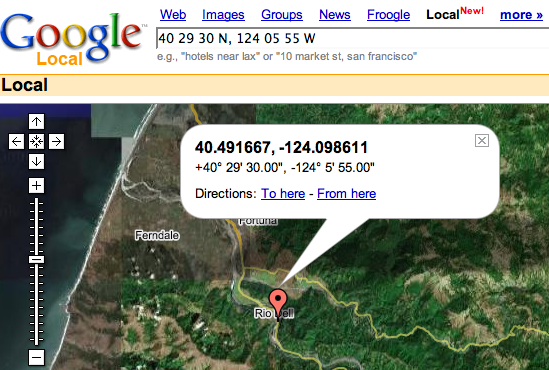
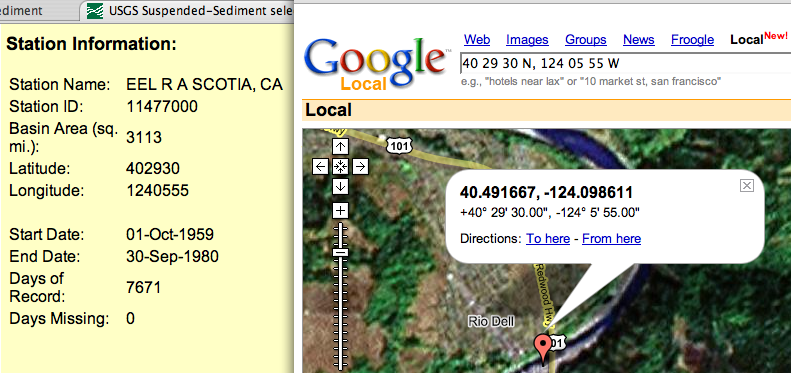


11.30.2005 06:06
USGS suspended sediment web pages
Update: Got a VERY quick
response from John at the USGS. The Lon,Lats are indead ddmmss or
dddmmss. The best relevant example of something like what I was
thinking for a google mash-up is Wunderground
stations. When their full database comes online, if the USGS
does not do an interface, I would like to jump in and give it a
go.
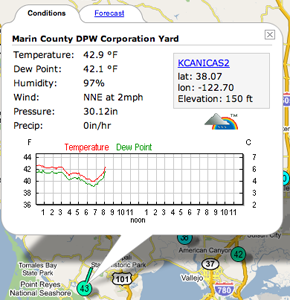
It is great that this data is online, but it is definitely confusing. Take a look at this sediment record, specifically at the lat,lon values. The lat,lon could use a little formatting help. It would be great to get this kind of info on a google mash-up web interface too! station id 11472150
Going by state, this is what I can find for the Eel. It is not obvious which station is the best.

It is great that this data is online, but it is definitely confusing. Take a look at this sediment record, specifically at the lat,lon values. The lat,lon could use a little formatting help. It would be great to get this kind of info on a google mash-up web interface too! station id 11472150
Station Information:
Station Name: EEL R NR DOS RIOS, CA
Station ID: 11472150
Basin Area (sq. mi.): 528
Latitude: 393730
Longitude: 1232025
Start Date: 01-Oct-1966
End Date: 30-Sep-1977
Days of Record: 4018
Days Missing: 0
And here is the table data:
Station Number Date Water Year Discharge (cfs) Discharge (cms) Concentration(mg/L) Load (ton/day) Load (Mg/day) 11472150 01-Oct-1966 1967 4 0.113 1 0 0 11472150 02-Oct-1966 1967 3.8 0.108 1 0 0 ... 11472150 20-Nov-1966 1967 4000 113 2630 28400 25800Looks like there are some rounding errors.
Going by state, this is what I can find for the Eel. It is not obvious which station is the best.
11472150 EEL R NR DOS RIOS, CA 11472500 EEL R AB DOS RIOS, CA 11472800 MF EEL R AB BLACK BUTTE R NR COVELO, CA 11473000 MF EEL R BL BLACK BUTTE R NR COVELO, CA 11473900 MF EEL R NR DOS RIOS, CA 11474500 NF EEL R NR MINA, CA 11475000 EEL R A FORT SEWARD, CA 11475100 DOBBYN C NR FORT SEWARD, CA 11475500 SOUTH FORK EEL RIVER NR BRANSCOMB, CA 11475560 ELDER C NR BRANSCOMB, CA 11476500 SF EEL RIVER NR MIRANDA, CA 11477000 EEL R A SCOTIA, CAI don't have the energy today to dig through this kind of database. Nor did the paper I read on this say which station ID they used.
11.29.2005 21:20
NASA MER Press Release
This is a press release about the
EPSL issue about the MER results. Now it is time for the research
community outside of the MER team to step up with their take on the
results. I waiting until after I graduate to get back into this
topic.
Featured on Science Daily
Featured on Science Daily
RELEASE: 05-415
NASA Rover Helps Reveal Possible Secrets of Martian Life
Life may have had a tough time getting started in the ancient environment that left its mark in the Martian rock layers examined by NASA's Opportunity rover. The most thorough analysis yet of the rover's discoveries reveals the challenges life may have faced in the harsh Martian environment.
"This is the most significant set of papers our team has published," said Dr. Steve Squyres of Cornell University, Ithaca, N.Y. He is principal investigator for the science instruments on Opportunity and its twin rover, Spirit. The lengthy reports reflect more thorough analysis of Opportunity's findings than earlier papers.
Scientists have been able to deduce conditions in the Meridiani Planum region of Mars were sometimes wet, strongly acidic and oxidizing. Those conditions probably posed stiff challenges to the origin of Martian life.
Based on Opportunity's data, nine papers by 60 researchers in volume 240, issue 1 of the journal Earth and Planetary Science Letters discuss what this part of the Martian Meridiani Planum region was like eons ago. The papers present comparisons to some harsh habitats on Earth and examine the ramifications for possible life on Mars.
Dr. Andrew Knoll of Harvard University, Cambridge, Mass., a paper co-author, said, "Life that had evolved in other places or earlier times on Mars, if any did, might adapt to Meridiani conditions, but the kind of chemical reactions we think were important to giving rise to life on Earth simply could not have happened at Meridiani."
Scientists analyzed data about stacked sedimentary rock layers 23 feet thick, exposed inside "Endurance Crater." They identified three divisions within the stack. The lowest, oldest portion had the signature of dry sand dunes; the middle portion, windblown sheets of sand with all the particles produced in part by previous evaporation of liquid water. The upper portion corresponded to layers Opportunity found earlier inside a smaller crater near its landing site.
Materials in all three divisions were wet both before and after the layers were deposited by either wind or water. Researchers described chemical evidence that the sand grains deposited in the layers had been altered by water before the layers formed. Scientists analyzed how acidic water moving through the layers after they were in place caused changes such as the formation of hematite-rich spherules within the rocks.
Experimental and theoretical testing reinforces the interpretation of changes caused by acidic water interacting with the rock layers. "We made simulated Mars rocks in our laboratory then infused acidic fluids through them," said researcher Nicholas Tosca from the State University of New York. "Our theoretical model shows the minerals predicted to form when those fluids evaporate bear a remarkable similarity to the minerals identified in the Meridiani outcrop."
The stack of layers in Endurance Crater resulted from a changeable environment perhaps 3.5 to 4 billion years ago. The area may have looked like salt flats occasionally holding water, surrounded by dunes. The White Sands region in New Mexico bears a similar physical resemblance. "For the chemistry and mineralogy of the environment, an acidic river basin named Rio Tinto, in Spain, provides useful similarities," said Dr. David Fernandez-Remolar of Spain's Centro de Astrobiologia.
Many types of microbes live in the Rio Tinto environment, one of the reasons for concluding that ancient Meridiani could have been habitable. However, the organisms at Rio Tinto are descended from populations that live in less acidic and stressful habitats. If Meridiani had any life, it might have had to originate in a different habitat.
"You need to be very careful when you are talking about the prospect for life on Mars," Knoll said. "We've looked at only a very small parcel of Martian real estate. The geological record Opportunity has examined comes from a relatively short period out of Mars' long history."
11.29.2005 08:56
Digital Rights Management for the Geospatial Community
Digital
Rights Management for the Geospatial Community - scary. Is this
going to be like sony and their root kit?
What is the University Consortium for Geographic Information Science?
Q&A: Vint Cerf on Google's challenges, aspirations
What is the University Consortium for Geographic Information Science?
Q&A: Vint Cerf on Google's challenges, aspirations
What do you make of the mashups phenomenon? I can't tell you how excited I am about it. We know we don't have a corner on creativity. There are creative people all around the world, hundreds of millions of them, and they are going to think of things to do with our basic platform that we didn't think of. So the mashup stuff is a wonderful way of allowing people to find new ways of applying the basic infrastructures we're propagating. This will turn out to be a major source of ideas for applying Google-based technology to a variety of applications.
11.29.2005 08:07
twisted gps
Wow. I typed twisted gps
into the location field in firefox and got taken straight to this
page!
twisted.protocols.gps.nmea.NMEAReceiver
No such luck with AIS. The protocols page does not show any protocols for AIS.
twisted.protocols.gps.nmea.NMEAReceiver
This parses most common NMEA-0183 messages, presumably from a serial GPS device at 4800 bps
No such luck with AIS. The protocols page does not show any protocols for AIS.
11.28.2005 19:34
Auto-Carto call for papers
Auto-Carto 2006: Call for Papers - Heathman Lodge, Vancouver,
Washington June 26-28, 2006.
Topics:
Topics:
- yada yada web mapping yada yada
- Homeland security
- Geovisualization
- Geovirtual Environments
- Geospatial Data Models
- Geospatial Data Integration
- Spatial Data Mining
- Map Use and Design
- Spatial Cognition
- Projection and Transformation of Geographic Databases
- Spatialization
- Geographic and Cartographic Standards
11.28.2005 16:49
OpenStreetMap
I was talking to Alex about the
idea of a community developed map based on input from people with
GPS units. What do I run into just a week later, but exactly that.
Open Street
Map
The Rayming TN200 USB GPS Receiver seems like a snazzy little device. I wonder how it really interfaces to the system. Would it be easy to integrate into any C or Python program on Mac or Linux? I really don't know what is in this driver: macdriverpl2300 1.0.8 zip. It can't be too bad, since gpsdrive says it works with the TripNav TN200.
Deluoe Electronics also has one that looks like it would work.
The GPS buyers guide did not seem to talk about what I am looking for. I want something pretty different for starters. I just want a USB device. No need for a screen to waste power. Then eventually, I want to get a hand help device that integrates with it.
One suggestion was the Macmap group on Yahoo.
The BU-303 USB GPS Receiver has WAAS, but is it usable?
One main point is that it looks like having WAAS support is a very good thing. The TN-200 says that it is WAAS-capable. What does that mean?
If a device is listed on the gpsd hardware page then it has got to be mot to bad to use, right?
OpenStreetMap is a project aimed squarely at creating and providing free geographic data such as street maps to anyone who wants them. This is because most maps you might think of as free actually have legal or technical restrictions on their use, holding back people from all walks of life who would like to use a map for one reason or another.Question: GPS and the Mac
OpenStreetMap has created a cool online editing interface that allows anyone to upload their GPS tracks and contribute to the map. The data created can then be used in lots of different ways for free - something that isn't possible with commercial mapping.
The Rayming TN200 USB GPS Receiver seems like a snazzy little device. I wonder how it really interfaces to the system. Would it be easy to integrate into any C or Python program on Mac or Linux? I really don't know what is in this driver: macdriverpl2300 1.0.8 zip. It can't be too bad, since gpsdrive says it works with the TripNav TN200.
Deluoe Electronics also has one that looks like it would work.
The GPS buyers guide did not seem to talk about what I am looking for. I want something pretty different for starters. I just want a USB device. No need for a screen to waste power. Then eventually, I want to get a hand help device that integrates with it.
One suggestion was the Macmap group on Yahoo.
The BU-303 USB GPS Receiver has WAAS, but is it usable?
One main point is that it looks like having WAAS support is a very good thing. The TN-200 says that it is WAAS-capable. What does that mean?
If a device is listed on the gpsd hardware page then it has got to be mot to bad to use, right?
11.28.2005 16:33
OS development
A lot of this stuff will be
helpful if I ever get back into embedded development.
osdever.net tutorials
osdever.net tutorials
11.28.2005 13:47
ClamXav
On Nathan's suggestion I just
gave ClamXav a try. Not bad. I
still may end up going with an anacron job and/or checking out the
daemon package in fink.
Also, I did a quick test with a demo virus file to make sure that the fink ClamAV is actually doing anything (I've never had it find anything). I used Nathan's suggestion for a test virus and got this:
Also, I did a quick test with a demo virus file to make sure that the fink ClamAV is actually doing anything (I've never had it find anything). I used Nathan's suggestion for a test virus and got this:
open http://www.eicar.org/anti_virus_test_file.htm
# Down load the eicar.com test virus to my desktop
/sw/bin/clamscan --bell -r --log=/Users/schwehr/Desktop/virus-scan.txt \
-i /Users/schwehr/Desktop/eicar.com
cat ~/Desktop/virus-scan.txt
========================================
Scan started: Mon Nov 28 13:42:05 2005
/Users/schwehr/Desktop/eicar.com: Eicar-Test-Signature FOUND
== summary ==
Known viruses: 41289
Engine version: 0.87.1
Scanned directories: 0
Scanned files: 1
Infected files: 1
Data scanned: 0.00 MB
Time: 3.130 sec (0 m 3 s)
Yeah! It actually did something. If I use anacron, I am
thinking of something like this as the script.
/sw/bin/fink update clamav clamav-dev clamav-shlibs /sw/bin/freshclam /sw/bin/clamscan --bell -r --log=/Users/schwehr/Desktop/virus-scan.txt -i / if [ $? != 0]; then somescript that notifies me obnoxiously if there is a virus found maybe use growl maybe touch "/Users/schwehr/Desktop/VIRUS_FOUND" fi
11.28.2005 08:49
Autodesk MapServer code LGPL
MapServer Enterprise 0.9.1 download
... Feature Data Objects (FDO) technology and FDO providers. At this time providers for ESRI Shape and the Spatial Data File format are included. The FDO package must be downloaded and built prior to building MapServer Enterprise.
In a future site update, FDO will be a separate component. In addition, we will provide a more complete set of FDO providers including SDF, SHP, WMF, WSF, ODBC, ArcSDE, and more. ...
11.27.2005 23:56
gpx
Online Sources of GPS Waypoints and Tracks
MotionBased uses the open standard .gpx format, which is being embraced by more and more software manufacturers over time. An extensive list of online sources of .gpx data is available from TopoGrafix, the developer of EasyGPS and ExpertGPS. This list encompasses everything from dive spots to UK hiking trails. Travel by GPS, one of the sources on the list has a page posted on data I contributed--my Mt. Diablo circumnavigation. I haven't tried every source on the list, but GPXchange and TrailRegistry look particularly interesting.
11.27.2005 13:03
sqlite control center (sqlitecc)
SqliteCC is great! It is a nice
little GUI to look through sqlite databases. There is a seperate
version to examine sqlite3 databases. Run any sort of query
too.
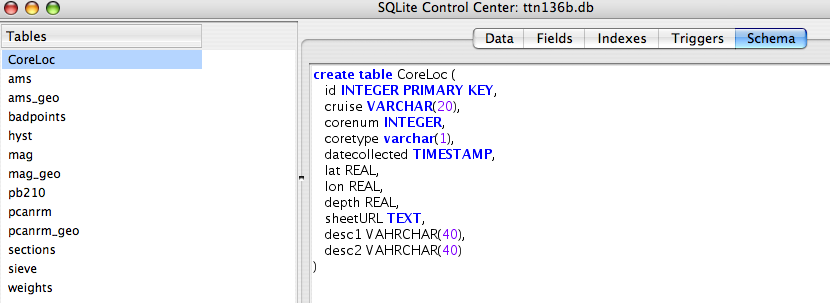
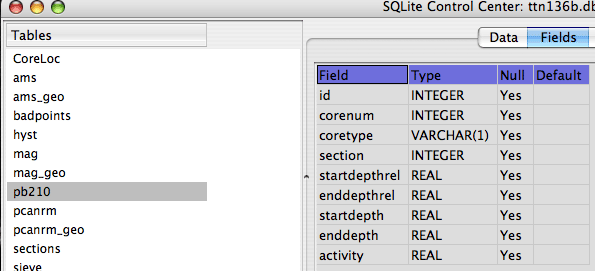
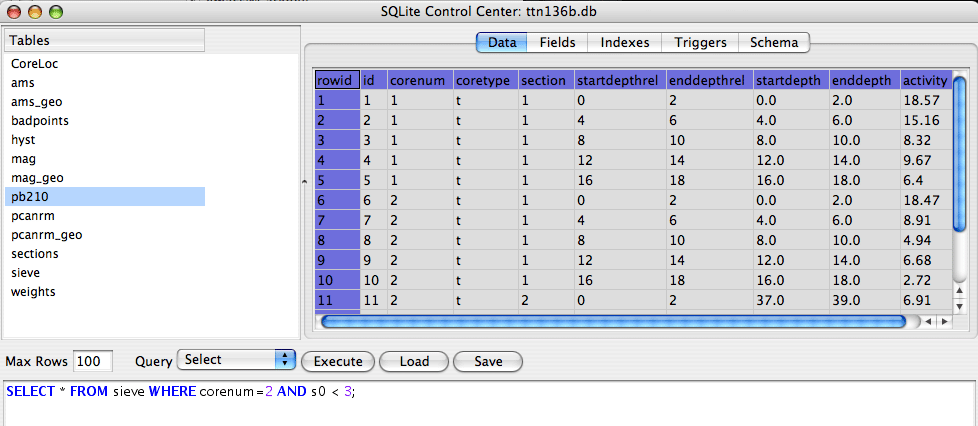



11.27.2005 09:31
Python database API specification
From Diez B. Roggisch: (and a
similiar comment by Fredrik Lundh)
Use paramtetrized cursor.execute(..) That is instead of doing
c.execute("insert into foo values ('%s')" % mytext)
do
c.execute("insert into foo values (?)", mytext)
Attention, the actual style of a parameter is dependand on your
database, e.g. oracle uses a differnet one:
c.execute("insert into foo values (:mytext)", dict(mytext=mytext))
The actual style to use is given in the docs, or can be queried with
connection.paramstyle. I recommend reading the DB-API 2.0 specs.
PEP 0249
- Python Database API Specification v2.0 (07 Apr 1999)11.24.2005 10:37
SQLObject
SQLObject is a very exciting python
package. It wraps Postgres, MySQL, and SQLite databases in a common
API and provites a lot of help to make interacting with SQL
databases more pythonic. From the documentation:
db_filename = os.path.abspath('data.db')
if os.path.exists(db_filename):
os.unlink(db_filename)
connection_string = 'sqlite:' + db_filename
connection = connectionForURI(connection_string)
sqlhub.processConnection = connection
...
class Person(SQLObject):
firstName = StringCol()
middleInitial = StringCol(length=1, default=None)
lastName = StringCol()
Causes a person table to be created:
CREATE TABLE person (
id INT PRIMARY KEY AUTO_INCREMENT,
first_name TEXT,
middle_initial CHAR(1),
last_name TEXT
);
11.24.2005 08:00
debian and python eggs
There is a monster discussion on
python eggs yesterday and today on python eggs and Debian. The only
reason I am subscribed to that list is to try to figure out how to
cope with eegs in fink. I still have no clue what to do about them.
I need to see what is in dh_python. It would be nice to have a what
to have a package say what dependencies it really has so that I can
put them in the fink info file, but I do NOT want eggs to mess with
other packages. That will break fink.
From: Josselin Mouette Subject: Re: [Distutils] formencode as .egg in Debian ??I also saw something about easy_deb in eggs.
Phillip J. Eby a ?crit : > And over the last few months, I believe we've also succeeded in stomping > most of the issues that people had with getting solid non-root > installations on their Linux distributions. So the reasons for developers > to prefer their dependencies to be managed as eggs will only improve over > time, as the egg system allows Python developers to control and introspect > their dependencies, rather than keeping that information hidden behind > diverse platform-specific packaging tools.
This is useful for non-root installations, but it is only a hassle when you are making .deb's. Here, dependencies are already handled, and you rely on the system to provide correct versions for packages you depend upon.
> It's only "competitive" if you feel that there must be only one way to do > it. (And if you do feel that way, then it also should be obvious that eggs > are the superior solution, since they don't take away any capabilities of > the old, only provide new ones.)
They only introduce more complexity, instead of bringing real features.
> Obviously, every individual distribution would like to have Python packages > conform to their individual system. However, on the whole, it is clearly > better for the Python developer to have practical dependency management > that doesn't tie their efforts to a single platform, packaging system, or > distribution.
And that's why there are things like dh_python to adapt python distutils installations to be compliant to the Debian way of things. However, eggs make it so complicated that the adaptation layer would be unmaintainable. This is a good reason to think the whole egg system should be avoided.
11.23.2005 16:27
Alias going away
Alias has been seriously sucking
for a while and I stopped watching, so this does not surprise
me.
... The spy drama starring Jennifer Garner will end its five-season run in May, ABC announced Wednesday, promising a big finish. ... "Alias is not going to wind down as it comes to an end, it's going to rev up, and we're going to make it the event it deserves to be," ABC Entertainment President Stephen McPherson said in a statement. ...Alias
11.23.2005 10:13
Where iPods stash music
Here is a fun thing to try... I
had a song that is on my iPod, but not on my laptop. I am far away
from my music collection, su I would like to get it back on my
laptop. Since iTunes will not let me drag from my iPod, I
had to figure out where the actual file is stashed on the iPod.
Apple has tried to make it hard to see where the files are by not
doing an artist/album hierarchy. The trick is to play the song so
that the mp3 file is open and use lsof (list of open files) to find
out what file is open...
> lsof | egrep -i 'mp3|aac|m4a' iTunes 15748 schwehr 21r VREG 14,6 62808865 3996 /Volumes/myiPodRev2/iPod_Control/Music/F18/somesong.mp3
11.23.2005 09:40
Xstar chirp schematic
Here is a quick schematic of the
transducers and receivers on the bottom of the Driscoll Xstar
CHIRP.
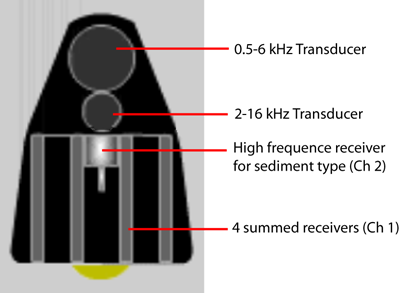
And a very nasty and saturated picture of the bottom of the fish. I used Photoshop's Image - Adjust Levels tweak to bring out the bottom of the fish which was in shadow, so that is why this image looks so bad.
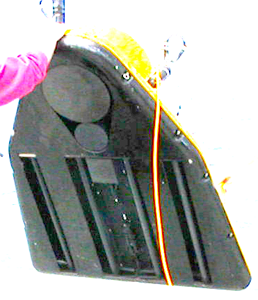

And a very nasty and saturated picture of the bottom of the fish. I used Photoshop's Image - Adjust Levels tweak to bring out the bottom of the fish which was in shadow, so that is why this image looks so bad.

11.23.2005 07:47
SSV MER on Mars
Mars rover
comes alive with Hollywood special effects
More cool images using the Dan Maas model by Zareh and Eric.
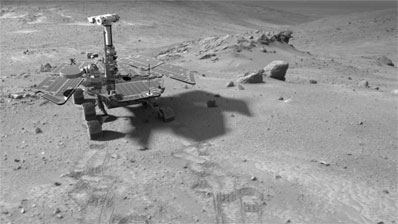
More cool images using the Dan Maas model by Zareh and Eric.

11.22.2005 21:53
pasteboard from shell scripts
On Mac OSX in a xterm (you don't
use terminal, right?!?), do this:
echo "hello" | pbcopy touch foo.txt open foo.txt # TextEdit appears editing foo.txt Apple-V # hello is now pasted in you TextEdit windowNow do the reverse
touch foo.txt open foo.txt # Type this in TextEdit This is textedit # Highlight the above line and copy it Apple-C # Go back to your xterm... pbpaste # "This is textedit" appears in your terminal
11.22.2005 07:17
ucsd net ops
So many times I find people don't
realize that computers log much of what they do on the net. Other
than luper worm entries, this one caught my eye today.
# Hits Files KBytes Visits Hostname 18 471 0.54% 201 0.27% 335 0.00% 6 0.07% netops-security-1.ucsd.eduChris, is that you?
11.21.2005 19:01
firefox updater
I just restarted firefox doing an
update a few days ago. The installation on restart of the browser
was about 1/2 a minute total. The only thing that I don't like is
that the about pane only says Firefox 1.5, when it is just 1.5 RC
2. How about an expert button? Even about Does
not gove all that much info:
Mozilla/5.0 (Macintosh; U; PPC Mac OS X Mach-O; en-US; rv:1.8) Gecko/20051111 Firefox/1.5At least the release date is in there.
11.21.2005 12:41
scipy f distribution work around
Thanks to Travis for a workaround
with the f-distributions. There is a problem with array
handling.
ipython In [1]: import scipy.stats In [2]: scipy.stats.distributions.f.ppf(0.95,2,9) Out[2]: 0.0 In [3]: scipy.stats.distributions.f.ppf([0.95],2,9) Out[3]: array([ 4.25649473]) In [4]: scipy.stats.distributions.f.ppf([0.95],2,9)[0] Out[4]: 4.256494729093748
11.21.2005 10:53
scipy f distribution issue submitted to bugtracker
I just submitted a bug to scipy
for the f distribution: issue250
11.21.2005 09:11
Python home weatherstation software
http://www.dotfunk.com/projects/weatherupdate/
Is there a home automation python library?
Now I just need some hardware and a some free time to give this a try!
WeatherUpdate is intended to be used with Davis Monitor II, Oregon Scientific WM-918, and WMR-968. It manages all the communication to and from the weather station hardware and exports the current conditions to a varity of services and software.For Perl, there is MisterHouse that also does home automation or wxnet.
It can upload the current conditions to the Internet via via www.wunderground.com. Click here for more information about the Personal Weather Station Project.
It is written in Python.
Is there a home automation python library?
Now I just need some hardware and a some free time to give this a try!
11.21.2005 08:55
pmag-kds-py 0.11
Just released pmag-kds-py 0.11,
which is mostly to compensate for scipy's f distribution code being
broken (again).
- ams.py: Added getShapeName, getF12/23 now hardcoded(scipy bad)
- ams.py: Added getLparam, getFparam, getEta
- pmag_sqlhelp.py: Added sqlInsertStrFromList
- ttn136b.py: Added BadSamples class
11.21.2005 07:36
possible scipy regression
This morning, I rebuilt my AMS
graphs for my paper and got that all but a couple samples here
trixial. What the? This is totally not what was going on last week.
I logged into my server and did the sample thing there and got the
old results with samples falling in every catagory and looking much
more plausible. The F distribution code in scipy was broken for a
very long time and recently started working. It looks like there
may be a regression that happened at the same time I started
getting those import printouts. Here is what I am seeing on my
server that has not been updated. This is what I expect.
fink list scipyNow for the broken results on my laptop:
i scipy-py24 1:0.3.2-2 Scientific tools for Python
import ams >>> ams.getF() 3.4817 >>> ams.getF12() 4.25649472909 >>> import scipy.stats >>> scipy.stats.distributions.f.ppf(0.95,2,9) 4.25649472909
fink list scipy i scipy-core-py24 0.6.1-2 Replacement of Numeric python i scipy-py24 1:0.4.3-1 Scientific tools for PythonTime to hardcode the 0.95 values (again) and move on.
In [1]: import ams In [2]: ams.getF() Out[2]: 3.4817 In [3]: ams.getF12() Importing io to scipy Importing fftpack to scipy Importing special to scipy Importing utils to scipy Importing cluster to scipy Importing sparse to scipy Importing interpolate to scipy Importing lib to scipy Importing integrate to scipy Importing signal to scipy Importing optimize to scipy Importing linalg to scipy Importing stats to scipy Out[3]: 0.0 In [4]: import scipy.stats In [5]: scipy.stats.distributions.f.ppf(0.95,2,9) Out[5]: 0.0
11.19.2005 12:38
scpipy crankiness
Scipy is acting cranky. I now get
this when ever I import scipy. Very annoying.
Importing io to scipy Importing fftpack to scipy Importing special to scipy Importing utils to scipy Importing cluster to scipy Importing sparse to scipy Importing interpolate to scipy Importing lib to scipy Importing integrate to scipy Importing signal to scipy Importing optimize to scipy Importing linalg to scipy Importing stats to scipyThis is with fink scipy-core-py24 0.6.1-2 and scipy-py24 1:0.4.3-1.
11.19.2005 12:24
python sets
I want to make a quick list of
bad samples and make it easy to quickly test against this. Here is
a quick walk through of sets, which are basically what I want.
s1 = set()
s1.add('foo')
s1.add('bar')
s2 = set()
s2.add('blah')
s2.issubset(s1)
False
s2 = set()
s2.add('foo')
s2.issubset(s1)
True
11.19.2005 10:50
Naval Shipyard to add acoustic test facility
Congress
approves $8.1 billion for testing facility at PNS - The article
says $8.1M which I believe more than billion.
... The funding will be used to construct a new acoustic test and calibration facility.
According to Rep. Tom Allen, D-Maine, on Friday the final report for the Fiscal Year 2006 Military Quality of Life and Veterans Affairs Appropriations bill was completed and it included funding for the shipyard. ... A new acoustic testing and calibration facility will provide the Navy with a greater capacity to test and calibrate submarine and surface ship hydrophones and transducers, shipyard public affairs officer Danna Eddy said in a previous interview. ...
11.19.2005 07:38
USGS ISIS
Just saw another release
announcement for the USGS ISIS planetary image processing package
(2.something). Looks like they still are not into my request for a
tar of the SOURCE. It really feels like they are from the mainframe
centralized control era. It sounds like they want to distribute
EVERYTHING in this tar. How big can their source be? Can be more
than a couple hundred MB for a tar.bz2, right? I am not looking to
have the data up as a tar. And as for the porting, if you give out
the source, then people can help contribute back more efficiently.
Fink can handle the dependencies for you. We may have to add a
package or two, but you just say Depend: qt3-shlibs and it gets
built. Plus you will get the mirroring of sourceforge to reduce
your bandwidth requirements.
I really want to be able to have ISIS in fink before the next Mars mission (and I wish for Vicar/FEI/and??). Then we could get probably 80% of the scientists to have ISIS (since almost all have Macs).
I seemed to have annoyed the ISIS team with my request. Sorry guys. Just trying to see how to make things better for everyone involved.
As for darwinports being the way to go... it does not matter. If you did darwinports, then I could translate that to fink or the other way around. It does not matter! They are both good and not mutually exclusive.
I really want to be able to have ISIS in fink before the next Mars mission (and I wish for Vicar/FEI/and??). Then we could get probably 80% of the scientists to have ISIS (since almost all have Macs).
I seemed to have annoyed the ISIS team with my request. Sorry guys. Just trying to see how to make things better for everyone involved.
As for darwinports being the way to go... it does not matter. If you did darwinports, then I could translate that to fink or the other way around. It does not matter! They are both good and not mutually exclusive.
11.18.2005 15:21
3Dconnexion SpacePilot
3Dconnexion Boosts
SpacePilot Performance for Autodesk Inventor
LOS GATOS, Calif. - November 8, 2005 - 3Dconnexion, a Logitech (SWX:LOGN) (NASDAQ:LOGI) company, announced today a significant advancement to its innovative adaptive sensing technology, allowing the 3Dconnexion SpacePilot 3D controller to detect and rapidly adapt to more than twenty-one environments for Autodesk Inventor. As the user's workflow moves among environments and sub-environments within Autodesk Inventor, the SpacePilot automatically detects the workflow change, updates its function keys with new commands and displays them on its LCD screen. Default functions are provided for each environment, and the user can also customize the function keys by choosing from the entire set of Autodesk Inventor commands. ...Hey 3Dconnexion guys: How about announcing solid Space* support for SIMS Coin/SoXt/SoQt (SGI's OpenInventor done better than SGI did)?!?!?!
11.18.2005 12:33
Linux real-time and embedded papers
16 papers on
real-time and embedded Linux [ linuxdevices.com ]
LinuxDevices.com is pleased to publish the proceedings from the Seventh Real-Time Linux Workshop held in Lille, France, November 3-4, 2005, at the University for Science and Technology of Lille (USTL). The papers span a broad range of topics, ranging from fundamental real-time technologies to applications, hardware, and tools.Too bad there are no audio versions that I could listen to on the shuttle. I was also bummed to see that most of the MIT open courseware has RealAudio streams but no mp3 or oggs. I would love to have the magnetics and linear algebra lectures to brush up with.
11.18.2005 10:38
Martian landslide triggered by imact
I am really not sure what I am
looking at with this image... I think it needs a regional image and
a second one with overlayed interpretation.
Landslide in Mutch [ MSSS ]
Landslide in Mutch [ MSSS ]
This Mars Global Surveyor (MGS) Mars Orbiter Camera (MOC) image shows the east margin of a landslide off the southern rim of Mutch Crater in the Xanthe Terra region of Mars. This particular landslide was likely triggered by a meteor impact that occurred nearby.
11.18.2005 10:07
subqueries for Banerjee plot
Myche just helped me work though
building an SQL query to generate the data for a Banerjee plot. In
plotting ARM100mT and IRM10kGauss, I have to pull the pairs out of
different rows in the same table. Turns out this can be done with
either temporary tables or subqueries. I started down the subquery
path here, so that is what I will show.
First the schema for the table.
First the schema for the table.
CREATE TABLE mag ( samplename VARCHAR(40), treatment REAL, csd REAL, intensity REAL, dec REAL, inc REAL, timeMeasured TIMESTAMP, type VARCHAR(10), operator VARCHAR(20), depth REAL, cruise VARCHAR(20), corenum INTEGER, coretype VARCHAR(1), corehalf VARCHAR(1) , section INTEGER, sectionoffset REAL);The type field is either "arm" or "irm" for each measurement made on Flo the magnetometer. So I have a two rows, both with the same sample name that need to be joined together, but the intensity value for each must be renamed.
samplename type intensity ========== ==== ========= ttn136b-2pw-s6-100 irm 0.0026260000 ttn136b-2pw-s6-100 arm 0.0000352900
To solve this I made a subquery for each for irm and arm samples, renamed the fields and joined them by matching names. This does leave out the problem of separating cores from each other, but that is pretty easy to add and will just make this example more confusing.
#!/bin/bash # q1="SELECT samplename AS armsample, intensity AS arm FROM mag WHERE type='arm'" q2="SELECT samplename AS irmsample, intensity AS irm FROM mag WHERE type='irm'" # sqlite ttn136b.db "SELECT irm,arm FROM ($q1),($q2) WHERE armsample=irmsample;"
This results in this query getting sent to sqlite:
SELECT arm,irm FROM \
(SELECT samplename AS armsample, intensity AS arm FROM mag WHERE type='arm') \
,(SELECT samplename AS irmsample, intensity AS irm FROM mag WHERE type='irm') \
WHERE armsample=irmsample;
11.18.2005 09:01
geotools - java OGC
If I were a big Java programmer, I
would definitely check out GeoTools
11.18.2005 08:57
google labs papers
Publications related to Google
technology
Sawzall... location/time of google searches. First saw something like this at ATT in early 1999 on their big SGI, excpet the viz was in 3D and was telephone calls, not queries.

Sawzall... location/time of google searches. First saw something like this at ATT in early 1999 on their big SGI, excpet the viz was in 3D and was telephone calls, not queries.

11.16.2005 07:41
saving the net
Saving the Net: How to
Keep the Carriers from Flushing the Net Down the Tubes By Doc
Searls
I have been wanting to write something along these lines.
I have been wanting to write something along these lines.
They see a problem with freeloaders. On the tall end of the power curve, those 'loaders are AOL, Google, Microsoft, Yahoo and other large sources of the container cargo we call "content". Out on the long tail, the freeloaders are you and me. The big 'loaders have been getting a free ride for too long and are going to need to pay. The Information Highway isn't the freaking interstate. It's a system of private roads that needs to start charging tolls. As for the small 'loaders, it hardly matters that they're a boundless source of invention, innovation, vitality and new business. To the carriers, we're all still just "consumers". And we always will be.Doc only scratches the surface. I have a lot more building up in my head. The issue is not just the carriers, but Google, Yahoo, and Microsoft are in the process of destabilizing (aka centralizing) the internet. Why I think that the map-mashups show the heart of the problem... I fear the essay I am planning is maybe 4 months away.
11.16.2005 07:37
Almost to the point where I have to upgrade to 10.4
More and more things everyday point
to the fact that I need to upgrade to Mac OSX 10.4. I am starting
to get left behind with 10.3.9.
J2SE 5.0r3 for 10.4.2 or later.
J2SE 5.0r3 for 10.4.2 or later.
11.15.2005 12:00
AIS signals for positioning
In the strange ideas catagory, it
would be interesting to see what is possible by using AIS signals
for positioning of a receiver. Could use a combination of signal
strength, direction, and timing info. This would be like the new
receivers that do positioning from TV towers, but here the base
stations are not FIXED TV broadcast towers, but now (mostly) mobile
systems that are sending out their GPS location and velocity
vector.
11.15.2005 08:44
EPSL on MER site
Volume 240, Issue 1, Pages 1-190 (30 November 2005) Sedimentary
Geology at Meridiani Planum, Mars Edited by Steven W. Squyres and
Andrew H. Knoll
- Sedimentary rocks at Meridiani Planum: Origin, diagenesis, and implications for life on Mars
- Stratigraphy and sedimentology of a dry to wet eolian depositional system, Burns formation, Meridiani Planum, Mars
- Chemistry and mineralogy of outcrops at Meridiani Planum
- Provenance and diagenesis of the evaporite-bearing Burns formation, Meridiani Planum, Mars
- Geochemical modeling of evaporation processes on Mars: Insight from the sedimentary record at Meridiani Planum
- The Río Tinto Basin, Spain: Mineralogy, sedimentary geobiology, and implications for interpretation of outcrop rocks at Meridiani Planum, Mars
- Hematite spherules in basaltic tephra altered under aqueous, acid-sulfate conditions on Mauna Kea volcano, Hawaii: Possible clues for the occurrence of hematite-rich spherules in the Burns formation at Meridiani Planum, Mars
- An astrobiological perspective on Meridiani Planum
11.14.2005 11:53
bash trick - $RANDOM
Just discoved another interesting
BASH trick. If you are running bash as your shell, open up an xterm
(or I suppose a Terminal.app window if you must) and try this:
# echo $RANDOM
31162
Returns a 16 bit unsigned integer (ushort). Never knew this
before!11.13.2005 22:42
lines of code
I know that lines of code is
a horrible metric, but I felt like taking a 15 minute break to see
how many lines of code are in my thesis that are written by me.
There are a couple of big reasons why lines of codes sucks:

- I can do more in python in one line than with C (excepting macro craziness)
- There are a lot of embedded documentation strings
- What if I like or dislike whitespace lines?
- What if a project autogenerates files in certain languages? I do this for gnuplot in my thesis.
SKIP:='sioseis|dac-cmds|pltsegy|xsonar|pmag-py|giv|\~|bak|xvpics|\,v$$|\.in|foo|Away'I then ended up with this:
Total lines written:
C++: 37385
python: 22457
Makes: 6343
bash: 5594
C code: 4768
The big surprise for me is how much straight c code I still have
floating around. 75k lines of code is respectable for someone who
is officially a geologist 
11.13.2005 20:10
core data summary table
I needed to get a summary of what
data is available for my Eel River cores. Rather than go through
the files by hand or with awk and grep, I thought I'd create an SQL
program to crunch through all the possibilities. It turned out
pretty well. I could do more by introspecting the database, but
this is all that I need.
./summary.py
1 p: {'hyst: 000, ams: 062, arm: 000, afdemag: 048, irm: 000'}
1 t: {'hyst: 000, ams: 000, arm: 000, afdemag: 000, irm: 000'}
2 p: {'hyst: 013, ams: 064, arm: 000, afdemag: 064, irm: 000'}
2 t: {'hyst: 000, ams: 055, arm: 000, afdemag: 002, irm: 000'}
3 p: {'hyst: 000, ams: 051, arm: 000, afdemag: 051, irm: 000'}
3 t: {'hyst: 000, ams: 000, arm: 000, afdemag: 000, irm: 000'}
4 p: {'hyst: 000, ams: 064, arm: 000, afdemag: 063, irm: 000'}
4 t: {'hyst: 000, ams: 000, arm: 000, afdemag: 000, irm: 000'}
5 p: {'hyst: 000, ams: 074, arm: 000, afdemag: 000, irm: 000'}
5 t: {'hyst: 000, ams: 000, arm: 000, afdemag: 000, irm: 000'}
6 p: {'hyst: 000, ams: 000, arm: 000, afdemag: 000, irm: 000'}
6 t: {'hyst: 000, ams: 000, arm: 000, afdemag: 000, irm: 000'}
7 p: {'hyst: 000, ams: 065, arm: 000, afdemag: 065, irm: 000'}
7 t: {'hyst: 000, ams: 008, arm: 000, afdemag: 000, irm: 000'}
Yes, I did a little bit of search and replace to make the table
cleaner. Maybe I should add that to the code, but not today. Here
is the python for the above summary.py.
#!/usr/bin/env python
"""
Generate a summary of the data collected to date
"""
import sqlite,sys
def counts(db_cx,corenum,coretype):
results={}
corenum = str(corenum)
s = 'SELECT COUNT(samplename) AS count FROM '
s+= '(SELECT DISTINCT(samplename) AS samplename FROM '
s+= 'ams WHERE corenum='+corenum+' AND coretype="'+coretype+'"); '
cu.execute(s)
count = cu.fetchone()['count']
results['ams']=("%03d"%int(count))
#
s = 'SELECT COUNT(samplename) AS count FROM '
s+= '(SELECT DISTINCT(samplename) AS samplename FROM '
s+= 'mag WHERE corenum='+corenum+' AND coretype="'+coretype+'"'
s+= ' AND type="afdemag"'
s+='); '
cu.execute(s)
count = cu.fetchone()['count']
results['afdemag']=("%03d"%int(count))
#
s = 'SELECT COUNT(samplename) AS count FROM '
s+= '(SELECT DISTINCT(samplename) AS samplename FROM '
s+= 'mag WHERE corenum='+corenum+' AND coretype="'+coretype+'"'
s+= ' AND type="arm"'
s+='); '
cu.execute(s)
count = cu.fetchone()['count']
results['arm']=("%03d"%int(count))
#
s = 'SELECT COUNT(samplename) AS count FROM '
s+= '(SELECT DISTINCT(samplename) AS samplename FROM '
s+= 'mag WHERE corenum='+corenum+' AND coretype="'+coretype+'"'
s+= ' AND type="irm"'
s+='); '
cu.execute(s)
count = cu.fetchone()['count']
results['irm']=("%03d"%int(count))
#
corenum = str(corenum)
s = 'SELECT samplename FROM hyst;'
cu.execute(s)
count = 0
findStr = '-0'+corenum+coretype
for row in cu.fetchall():
if -1 != row['samplename'].find(findStr): count += 1
results['hyst']= ("%03d"%int(count))
#
return results
#
if __name__=="__main__":
cx = sqlite.connect("ttn136b.db")
cu = cx.cursor()
if True:
for corenum in range(1,8):
afor coretype in ('p','t'):
print corenum, coretype,':',
print ' ',counts(cx,corenum,coretype)
11.13.2005 17:38
counting samples in a database
I have lots of measurements (we call
them treatments) of samples in a database table. I would like to
have a count of how many samples have gone through the process. A
subquery using distinct passing to count will do the trick. Which
one of these is more correct? They both give the same answer.
sqlite ttn136b.db sqlite> SELECT COUNT(samplename) FROM (SELECT DISTINCT(samplename) AS SAMPLENAME FROM mag); 310 sqlite> SELECT COUNT(samplename) FROM (SELECT DISTINCT samplename FROM mag); 310The top one looks more correct to me, but the bottom one is shorter. It would be great if sqlite would tell me if what I was doing was iffy SQL. Just because some code works doesn't mean that it is a good idea.
11.12.2005 23:10
gnuplot
I posted on usenet (does anyone have
a real nntp feed anymore or is everyone using google groups???)
about gnuplot. I would like to have some variables that I can
control from the command line or environment variables, but it
seems like there is no joy. I did find out that 4.1 has looks of
new features. One I am really hoping for is being able to place
images into graphs. I have core photos and it seems silly to paste
them in with Illustrator. "Automation good."
I am not a number. I am not a number. I am not a number. I am a free man.The computer, however, is not free from my wrath.
11.12.2005 22:34
Arrested Development
I have to admit that I really like
the show 'Arrested Development'. I haven't really watched it on TV,
but earlier this year, we had quite the marathon. "There is money
in the banana stand!"
Fox puts abrupt stop to 'Arrested Development'
Fox puts abrupt stop to 'Arrested Development'
There was no official announcement -- there rarely is when the networks wield the ax -- but after two and half wonderfully funny seasons, Fox's Emmy-winning ``Arrested Development'' is dead.
Network TV's best comedy has been abruptly pulled from the Fox schedule for the rest of November sweeps and has had its `order'' for this season cut from 22 episodes to 13.
11.12.2005 22:31
Jar Head
Jar Head... this movie is awesome!
Just be warned that it really is not an action film.
11.12.2005 22:27
regex coach - interactive regular expressions
I was wrong. Gareth just told me that
the very cool program that he showed me a couple months ago is
actually Regex
Coach
My ucsd email seems to be unhappy, which makes me unhappy.
My ucsd email seems to be unhappy, which makes me unhappy.
11.11.2005 19:16
pmag 0.10
I am working on straightening out the
data for the Eel River Basin (TTN136B) cruise data. I am working on
adding the AGFM data to the database. Turns out I took some bad
data yesterday. I need to take data over a larger range. The tails
are really ugly. In the process, I have a new release of
pmag-kds-py (0.10).
- agfmsql.py - Deleted this file
- agfm.py - Now has sql database support
- agfm.py - Much improved
- ttn136b.py - Able to revert samplenames to original
- units.py - Added incFromLat using GAD model
910 agfm.py
193 ams.py
325 bpsio.py
445 fabricsim.py
128 pdfposter.py
33 pmag_kds_version.py
211 pmag_sqlhelp.py
52 pmag_verbosity.py
41 setup.py
256 ttn136b.py
228 units.py
885 xcore.py
379 xrd.py
4086 total
11.11.2005 15:37
What exactly are you selling?
Excuse me, but what exactly is it
that these folks are selling? Is it bathymetry, or are they trying
to imply more?
SeaZone Hydrospatial represents an important sea-change in marine data by comprising a comprehensive, accurate and current map of the entire marine environment and coastal zone. Being interoperable with Ordnance Survey mapping, it effectively continues the digital national framework offshore. The launch of SeaZone Hydrospatial reinforces the UK's reputation as a world leader in geographic information collection and provision and will consign the use of navigational charts back to the ship's bridge.
11.11.2005 07:36
python oop and scipy
Introduction
to OOP with Python Object Oriented Programming
[voidspace]
scipy05 conference presentations. Presentations on matplotlib, scipy, arrays, MPI, and more
scipy05 conference presentations. Presentations on matplotlib, scipy, arrays, MPI, and more
11.11.2005 07:32
Web maps I did not know about
I think I will stick to google maps
and yahoo beta maps, but it is good to know what else is out there
for that rainy day.
Web mapping is actually one item for a paper that I am thinking of
writing: Why the internet is failing to live up to its
design.
11.10.2005 19:47
python type casting and function args bytes me
I just ran into a simple case of
something that has worried me a bit about python. I have a function
foo that use to be like this:
On second thought, C++ would let me shoot myself the same way by casting an int to a bool without fuss.
def foo(arg1, argBoolFlag=False, argInt=0)Now I change foo to have a 2nd flag and I put the new flag after the 1st.
def foo(arg1, argBoolFlag=False, argBoolFlag2=False, argInt=0)Now my older code does bad things. Here is the old call:
badresults = foo(myarg1,True,1)Not checking that the flag args were actually boolean (True/False) values bit me. This is fine now since I'm working on a program with about 1000 lines. Not to bad to track down in code all written by me. Now what happens in a couple hundred thousand line system written by a team of people?
On second thought, C++ would let me shoot myself the same way by casting an int to a bool without fuss.
11.10.2005 11:36
planet geospatial
http://planet.spatiallyadjusted.com/
- planet geospatial is an aggregation of weblogs and web papages
about GIS and other spatial stuff.
11.09.2005 18:26
Just about to switch away from firefox
I think I've just seen the spinning
rainbow/pinwheel/pizza of doom on my laptop one too many times on
my mac while using Firefox. I think I might just have to go back to
Safari as my main browser.
I'm using 1.5 rc 1. Have to grab rc 2 which I hear is floating around.
I'm using 1.5 rc 1. Have to grab rc 2 which I hear is floating around.
top -o cpu -s 5 PID COMMAND %CPU TIME #TH #PRTS #MREGS RPRVT RSHRD RSIZE VSIZE 803 firefox-bi 15.0% 18:10.40 3 101 697 83.0M 48.9M- 99.9M+ 332MOkay, so I have a gig of ram, but there is no need to chew up so much.
11.09.2005 17:32
gnuplot multiplot strikes back
I am feeling a little frustrated with
plotting from within python today, so I went back to straight
gnuplot. Somehow, it is just simpler. I found a web page that I
really like so far for help with gnuplot. GNUPLOT - not
so frequently asked questions.
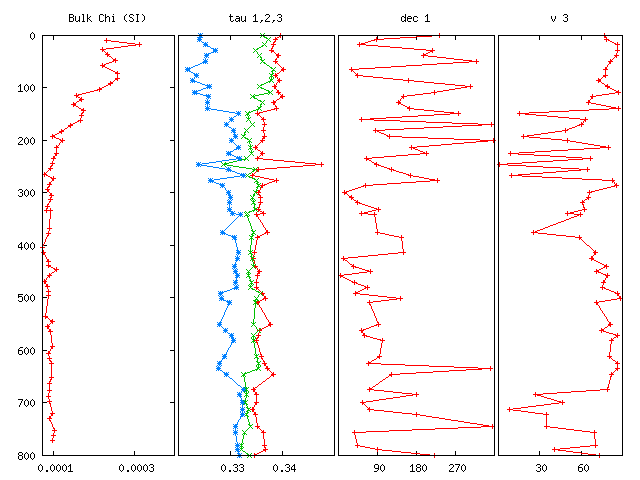
#!/bin/bash
#
!echo "#depth bulbsusc tau1 tau2 tau3 dec1 inc3" > 2p.dat
!sqlite ttn136b.db 'SELECT depth, bulksusc, tau1, tau2, tau3, \
dec1, inc3 FROM ams WHERE corenum=2 AND coretype="p" \
ORDER BY depth' | tr '|' '\t' >> 2p.dat
#
unset key
set yrange [] reverse
set multiplot
########################################
# Bulk suscecptabilty SI
set title 'Bulk Chi (SI)'
set xtics .0001,.0002
set origin 0,0
set size .3,1
plot '2p.dat' using 2:1 with lp
########################################
# tau 1, 2, 3 - eigen values
set title 'tau 1,2,3'
set noytic
set xrange [.32:.35]
set xtic .33, .01, .34
set origin .25,0
plot '2p.dat' using 3:1 with lp \
,'2p.dat' using 4:1 with lp \
,'2p.dat' using 5:1 with lp
########################################
# dec1 eigenvector (with minimum eigenvalue)
set title 'dec 1'
set xrange [0:360]
set xtic 90,90,270
set origin .5,0
plot '2p.dat' using 6:1 with lp
########################################
# inc3 eigenvector component (with minimum eigenvalue)
set title 'v 3'
set xrange [0:90]
set xtic 30,30,60
set origin .7,0
plot '2p.dat' using 7:1 with lp
#
unset multiplot
pause -1 'hit return dummy'
This yields a very imperfect plot, but it is heading in the right
direction. This is my first time really tweaking xtic to not
clobber neighboring plot labels across the bottom.
11.09.2005 11:14
pmag-kds-py 0.9
Just released pmag-kds-py 0.9...
- fabricsim.py: Version used in Santa Barbara paper (angles backwards)
- pmag_sqlhelp.py: Added sqlcreate class
- ttn136b.py: Added depthlookup.lookup2()
- xrd.py: More documentation and a sample card. Need more info
11.09.2005 09:41
ArcGIS supports python
For those in the know, I am sure that
this is old news, but I just discovered that ERSI's ArcGIS supports
the python language. However, it still is not available on Mac OSX
and I can't find (in 20 seconds) a good summary page on Arc/python
that is not a pdf. Someone know of the canonical non-pdf Arc/python
web page?
Introduction to Geoprocessing Scripts Using Python - ESRI class on python
slashgisrs
Worldwind has been forked as punt
Introduction to Geoprocessing Scripts Using Python - ESRI class on python
slashgisrs
Worldwind has been forked as punt
11.09.2005 07:29
People who map for those online maps
Don't blame the online mappers
reporter's notebook For the record, the guys who create those often-vexing online maps would like you to know it's not their fault.What we need is an open source mapping system for PDA's with embedded GPS units + a system for anonymizing who you are so the feds don't get to know your every move for free. If everyone had a "bitch" option to complain when directions were wrong or missing, would we have a better system? What if everyone had free access to the whole database? What could be created?
Or so they say. On a recent sunny Thursday morning, I went directly to the source to find out why online maps more than occasionally have bizarro directions that would make any good cabbie scoff.
Taking a leisurely drive around San Francisco's upscale Nob Hill neighborhood in a video camera-equipped van owned by Tele Atlas (one of the two main mapping data collectors), I realized that it's awfully hard to argue with video evidence. Tele Atlas has a van whirring with videos, computers and navigation equipment, capturing up-to-date navigation information about my city. ...
11.09.2005 07:22
Talk by Rick Rashid - MS Research - Record everything
Rick Rashid -
Microsoft Research - ETech 2005
Among the topics of discussion are technologies that would allow users to capture literally everything that happens to them, not just visually, but with other associated meta-data. Another interesting area of research is technology that can make almost any physical object into a computer interface and can create digital representations of objects that users can manipulate in the digital environment. mp3Think about this kind of device on a field geologist or someone working on a ship processing through a very large volume of material. This stuff is pretty scary from a privacy point of view, but the applications where that is not a problem (especially when there is a don't record button and an obvious "RECORDING" indicator) are enormous.
11.09.2005 07:08
fink mirror trouble
Whoops. I think the latest script for
configuring fink mirrors has a slight bug. I don't think any of
these countries are in North America.

It would be really nice to have some sort of tool that helped people pick mirrors. Maybe something that figured out who is geographically closest and has low ping times? I have no idea where many of these mirrors are located and how good their network drops are.
Choose a continent: (1) Africa (2) Asia (3) Australia (4) Europe (5) North America (6) South America, Middle America and Caribbean Your continent? [5] Choose a country: (1) No selection - display all mirrors on the continent (2) China (3) Georgia (4) Hong Kong (5) Indonesia (6) India (7) Japan (8) South Korea (9) Malaysia (10) Philippines (11) Saudi Arabia (12) Singapore (13) Thailand (14) Taiwan Your country? [1] 7I figure that Japan is the closest/fastest network of the bunch to San Diego

It would be really nice to have some sort of tool that helped people pick mirrors. Maybe something that figured out who is geographically closest and has low ping times? I have no idea where many of these mirrors are located and how good their network drops are.
11.09.2005 06:27
configuring php5 via apache2.0.x from fink
Because of my last post about
subversion (svn) I remembered that a while back I was unable to get
php5 working on my laptop to try out some simple php again. I got
totally frustrated back then. Configuring apache is worse than
using the command line configure for a linux kernel. But sometimes
you just stumble into the right thing at a later date. Here is what
I had before that DID NOT work.
AddHandler php-script php AddType text/html php AddType application/x-httpd-php-source phpsThen I ran into this very verbose (which is a good thing) description of installing apache2 on fink: Jay's how to install apache2 on fink. Based on his web page, I changed my /sw/etc/apache2/httpd.conf to have these lines.
DirectoryIndex index.html index.phpNow php5 is working. Woo hoo! Now I just need time to play with php some. I also probably need to read up on php security, but my laptop's webserver never sees the internet, so I can put that off.
AddType application/x-httpd-php .php .php3 .php4 .php5 .phtml AddType application/x-httpd-php-source .phps
11.09.2005 06:09
Apple talks about SVN and Apache 2.0.x
Getting
Control with Subversion and Xcode [apple.com]
This article talks about setting up svn and apache 2.0 on Mac OSX 10.4. I would like to remind people that if they use fink (or darwinports) to install these two systems, they can stay up to date much easier and should never have to patch anything. I can't wait to switch from CVS to SVN once I finish my doctoral dissertation!
yahoo pirate maps - I can't seem to find the burried treasure's location on the map.
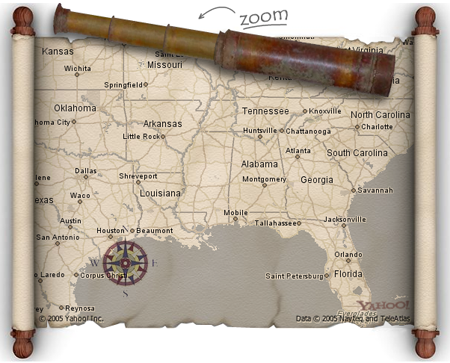
This article talks about setting up svn and apache 2.0 on Mac OSX 10.4. I would like to remind people that if they use fink (or darwinports) to install these two systems, they can stay up to date much easier and should never have to patch anything. I can't wait to switch from CVS to SVN once I finish my doctoral dissertation!
yahoo pirate maps - I can't seem to find the burried treasure's location on the map.

11.08.2005 17:40
GLintercept
http://glintercept.nutty.org/
Save all OpenGL function calls to text or XML format with the option to log individual frames. See here for an example of a single frames' XML logging.
11.08.2005 17:37
terrain-0.2 released
Talking to someone looking to dump
some geometry. The alias wavefront obj format is pretty dirt simple
to write, but terrain-0.1 did not have the xc-obj.[CH] files, so
now terrain-0.2 is out with that. You are welcome to use this code
under the GPL. The code is pretty low on documentation.
http://schwehr.org/software/terrain-0.2.tar.bz2
blender3d will read OBJ files.
http://schwehr.org/software/terrain-0.2.tar.bz2
blender3d will read OBJ files.
11.08.2005 12:50
python script to check references
This script compares the references
of figures to the label definitions of figures. These need to match
up in a paper! The key is to use findall().
#!/usr/bin/env python
import re
#
figRE = re.compile(r"\\ref{fig:([a-z]+)}")
figDefRE = re.compile(r"\\label{fig:([a-z]+)}")
#
cites = {}
labels = {}
#
for line in open('short.tex').readlines():
matches = figRE.findall(line)
if None!=matches:
for key in matches:
if cites.has_key(key):
cites[key] = cites[key]+1
else:
cites[key]=1
matches = figDefRE.findall(line)
if None!=matches:
for key in matches:
if labels.has_key(key):
labels[key] = labels[key]+1
else:
labels[key]=1
#
citesSet=set(cites)
labelsSet=set(labels)
diffSet = citesSet.difference(labelsSet)
if len(diffSet)>0:
print 'ERROR: missmatch between cites and labels...'
for key in diffSet:
print ' ',key
11.08.2005 12:13
3Dconnexion SpacePilot review
3Dconnexion SpacePilot review
... Primarily, the SpacePilot was designed with the intention of being used with 3D design software to manipulate perspectives and objects in three-dimensional space. In this type of application, the controller cap acts as an analogue to the axes of the virtual 3D world. Pulling, prodding, and manipulating the cap directly correlates to the movement of the camera or a 3D object.
I spend part of my time doing 3D design, and I am already quite used to the limitations of manipulating 3D space on a 2D plane in software such as Maya or 3ds max. These software packages have, since their inception, relied on the user's savvy with the simultaneous use of the keyboard and the mouse to provide the maximum interface flexibility possible. Even then, many users traditionally rely on the use of the three-button mouse in order to help translate the movement of the mouse on a flat surface into movements in space. But the act of "toggling" such movements is never a smooth one. ... Frankly, I love this thing. It's well-designed, well-built, well-implemented, and, well, works well!
11.08.2005 10:45
python regex
I need to do a little python regular
expression stuff to repeatedly crank through some documents to make
sure that the figure reference and figures matchup. I was getting
very frustrated that my matches were constantly empty. The trick is
NOT to use the match(lineStr) method. That always to tries to find
the match at the beginning of a line. Grrr. The correct method to
use is search(lineStr). I am sure that match() is faster, but ouch.
I would be so unlucky as to find a match() example first.
I am checking out some GUI regex tools since they make life easier when building re's. The first one I tried is kiki which comes as a part of SPE (Stanley's Python Editor). SPE is pretty rough around the edges, so I don't use that but kiki can be used by itself. Problem is that the fink package does not directly allow that to be done. i emailed the maintainer, but until then, here is how to use it directly.
The next one is kodos which is based on PyQT. I think this is the one that Gareth showed me. It is much slicker than kiki, but it will need some attention before it can go in fink (it has some path problems).
I am checking out some GUI regex tools since they make life easier when building re's. The first one I tried is kiki which comes as a part of SPE (Stanley's Python Editor). SPE is pretty rough around the edges, so I don't use that but kiki can be used by itself. Problem is that the fink package does not directly allow that to be done. i emailed the maintainer, but until then, here is how to use it directly.
sudo -s cat <<EOF > /sw/bin/kiki.py2.4 #!/bin/bashThat is ugly, but it does start kiki. wxGtk will complain about poll() being misused and kiki will eat way too much CPU/battery has it pummels the machine, but it does work. How do I make the fonts larger so I can read the text?
/sw/bin/python2.4 -OO /sw/lib/python2.4/site-packages/_spe/plugins/kiki/kiki.py EOF chmod +x /sw/bin/kiki.py2.4
The next one is kodos which is based on PyQT. I think this is the one that Gareth showed me. It is much slicker than kiki, but it will need some attention before it can go in fink (it has some path problems).
11.08.2005 09:55
oh and what does segmentation fault mean?
oh and what does segmentation fault mean? I got the program to compile and then when I tried to run it I got that errorHere is a quick sample of dealing with a seg fault. Start emacs and enter this BAD program as foo.C.
int main() {
int v[3];
v[100000]=-1;
return(0);
}
Then build the program with debugging enabled (-g):
M-x compile g++ -g foo.C -o fooRun the program
M-x compile ./foo # ./foo # Compilation segmentation fault at Tue Nov 8 09:57:51Whoops... something bad happened. Start the debugger.
M-x gdb gdb --annotate=3 fooNow use the debugger to see what is wrong. "(gdb)" is the debugger's prompt.
(gdb) break main (gdb) r # a.k.a "run" Starting program: /Users/schwehr/Desktop/foo Reading symbols for shared libraries . done # Breakpoint 1, main () at foo.C:3 (gdb)In the foo.C buffer, you should see a red circle on the line that the program is at.
(gdb) print v[0] $1 = 0 # Only in -g mode with variables be initialized to zero (I think) (gdb) n # a.k.a. "next" # Program received signal EXC_BAD_ACCESS, Could not access memory. 0x00001dec in main () at foo.C:3 (gdb) quitThat is it for the quick tutorial.
11.08.2005 09:51
Apple CHUD (or cud?)
Computer Hardware
Understanding Development Tools (CHUD Tools)
History's Worst Software Bugs
This is not quite the list that I would give, but there are some good ones. Would have been nice for them to give more links to actual details.
The CHUD Tools are applications and tools for measuring and optimizing software performance on Mac OS X as well as for hardware bringup and system benchmarking. For the very latest version, and for Project Builder/Jaguar developers, the CHUD Tools can be downloaded from this ftp site.
History's Worst Software Bugs
This is not quite the list that I would give, but there are some good ones. Would have been nice for them to give more links to actual details.
11.07.2005 22:39
Marine Geology - Mediterranean Prodelta Systems
Trincardi and Syvitski have a new volume in Marine Geology that starts off with:
Advances on our understanding of delta/prodelta environments: A focus on southern European margins
11.07.2005 13:44
agupp style for submitting
Today, I am working on the final
touches before resubmitting my Santa Barbara Basin paper. This is
the standard header that I use for LaTeX typesetting of my paper.
\documentclass[agupp]{aguplus}
For actually submitting the paper, it has to be in a very funky
special style that does double spacing and shoves my tables to the
end of the paper. The submission format requires this first line
instead of the one above.
\documentclass[agums]{aguplus} % For review - double spaced
It does not seem right to keep editing the paper for each format. I
decided to create another mode much like I have for creating a copy
without the figures (so it is much smaller). Here is the submit
rule from my Makefile:
submit:
echo "\documentclass[agums]{aguplus}" > ${NAME}-submit.tex
egrep -v 'documentclass|\$Id:' ${NAME}.tex |perl -p -e "s/bibliography{santabarbara}/bibliography{santabarbara-submit}/g" >> ${NAME}-submit.tex
cp ${NAME}.bib ${NAME}-submit.bib
pdflatex ${NAME}-submit.tex
bibtex ${NAME}-submit.aux
pdflatex ${NAME}-submit.tex
pdflatex ${NAME}-submit.tex
rm -f *-submit.{aux,bbl,blg,log,tex}
The first each creates the new header in a file. Then I append the
original tex file but strip the old documentclass and the RCS/CVS
Id, and change the bibtex file name (why do I have to do
this?)11.05.2005 19:21
mars ops
So who in San Diego has the Honda
with the license plate "Mars Ops?" Is it someone at MSSS?
11.05.2005 12:14
Embedding SQL commands in a gnuplot command file
This is my first time using the '!'
shell escape command in a gnuplot file to generate the datafiles
for a plot from within the gnuplot command file
(flinn-jelinek.bash). I have not yet done the Jelinek plot, so just
the Flinn plot here. I feel pretty clever right now 

#!/usr/bin/env gnuplot
# Build Flinn and Jelinek plots
#
#####################
# FLINN
#####################
#
# Build the data files for the plot
! sqlite ~/x/data/BPSIO-04/bpsio04.db 'select tau2/tau3,tau1/tau2 from ams where corenum=1' | tr '|' ' ' > 1.fl
! sqlite ~/x/data/BPSIO-04/bpsio04.db 'select tau2/tau3,tau1/tau2 from ams where corenum=2' | tr '|' ' ' > 2.fl
! sqlite ~/x/data/BPSIO-04/bpsio04.db 'select tau2/tau3,tau1/tau2 from ams where corenum=4' | tr '|' ' ' > 4.fl
# Flinn diagram is F vr L
set ylabel 'T1/T2 (L)'
set xlabel 'T2/T3 (F)'
#
set label 1 'Oblate' at 1.06, 1.04
set label 2 'Prolate' at 1.04, 1.06
#
set xrange [1:1.1]
#
set title 'Flinn Diagram'
f(x) = x
plot '1.fl' title 'Core 1'\
,'2.fl' title 'Core 2'\
,'4.fl' title 'Core 4'\
,f(x)
pause -1 "yo, press enter to move on with life"
11.05.2005 11:28
AIS to identify distressed ships
I believe AIS has info in the streams
to self identify when a ship is in distress, but what about
designing a network to watch ships along the coast? It would be
possible to flag ships that were acting outside of their normal
paramters or just flat dropped off AIS for too long. For example if
the crew was incapacitated, it would start to be clear that the
ship was adrift or not being steered. Matt mentioned that people
are looking into tracking AIS for monitoring pollution and whale
issues.
This idea follows after the NASA Ames Code-IC work to make a system for monitoring the health of spacecraft (specifically Hubble) and notify someone if unexpected events occured.
Coast Guard rescues 4 at sea
This idea follows after the NASA Ames Code-IC work to make a system for monitoring the health of spacecraft (specifically Hubble) and notify someone if unexpected events occured.
Coast Guard rescues 4 at sea
... Petty Officer Dean LaMontagne said the Seawitch V, based out of Portsmouth, N.H., was located 95 miles off the Maine coast when it was hit by a large wave, which broke windows and flooded out the inside of the vessel.
"They lost all electronics on the boat except for the radio," LaMontagne said. "The vessel couldn't go anywhere." ...
11.04.2005 22:12
more links
It never ends, especially when I have
a whole bunch of feeds in netnewswire. And the reduced traffic
side, I think that digg is starting to loose it's edge. Too many
repeats.
dshield.org - See if your machine has been owned and is being bad.
Port Authority - DarwinPorts GUI (ala fink commander). Then there is A bash script to automate DarwinPorts upgrades
Create customized weather satellite movies [macosx hints]
Yahoo Research and Yahoo Next
http://charlespetzold.com/etc/DoesVisualStudioRotTheMind.html
How Stuff Works - google-earth
Tasting Menu - Online cookbook - Japanesse.
EchoFX - USB video digitizers for the Mac.
SVK is decentralized version control system. It uses the Subversion.
Recent Landslides In La Conchita, California Belong To Much Larger Prehistoric Slide
Simpleview flash gallery generator.
Minix3 is out. Dave gave me a copy of the official minix distribution back in 91/92'ish. Minix3 sounds more interesting than previous versions... still not all that exciting.
dshield.org - See if your machine has been owned and is being bad.
Port Authority - DarwinPorts GUI (ala fink commander). Then there is A bash script to automate DarwinPorts upgrades
Create customized weather satellite movies [macosx hints]
Yahoo Research and Yahoo Next
http://charlespetzold.com/etc/DoesVisualStudioRotTheMind.html
How Stuff Works - google-earth
Tasting Menu - Online cookbook - Japanesse.
EchoFX - USB video digitizers for the Mac.
SVK is decentralized version control system. It uses the Subversion.
Recent Landslides In La Conchita, California Belong To Much Larger Prehistoric Slide
Simpleview flash gallery generator.
Minix3 is out. Dave gave me a copy of the official minix distribution back in 91/92'ish. Minix3 sounds more interesting than previous versions... still not all that exciting.
11.04.2005 22:09
swish-e search engine gets python API!
It seems silly to use spotlight for
some of the search ideas that I have been pondering. I like the
idea of being able to target swish-e right at just the data that I
want searched which is especially important if I intend to expose
the search to the web. Also, swish-e is cross platform and open
source. I never got the perl API working with fink, but I am
excited to give it a try with the python API.
SwishE python API.
SwishE python API.
11.04.2005 21:52
Lots of links
View the Moon in 3D on Your Desktop [slashdot]- NASA's World
Wind does clementine data. I remember when Deanne Tucker did that
for the Clementine data back in 1998 or so.
Yahoo!'s new twist on mapping APIs [Simon Willison's Weblog] - Never heard of Flex. Lots of different Yahoo API's.
SGI Powers San Diego State University's 3D Geospatial Mapping to Fuel Hurricane Relief Efforts... SGI's last gasps. Geomatrix, Eric Frost, CalIT2, and many of the usual cast of characters. But now NASA Ames. I don't really see the need for 10GigE... Err Ethernet is for LANs not WANs and we still have not figured out how to effectively use 10 or 100Mbit lines. P2P would be a big help here. Lots of local fast connections (like near by cities) would get critical data to endpoints faster. Maybe some day I will get to check out SGI OpenGL Vizserver.
Yet another package that needs to be in fink: OSSIM... after gdal-py, openev, and helping to finish up PyGMT (and and and)
Can remember why I through this had relevance to my future research, but it certainly is a purdy picture... http://www.aaronkoblin.com/work/faa/. Oh, yes, we need to do this for shipping tracking on the oceans. It's going to be an inverse of most of the flight traffic.
Becca sent me a link to the new snazzy browser Flock
Yahoo!'s new twist on mapping APIs [Simon Willison's Weblog] - Never heard of Flex. Lots of different Yahoo API's.
SGI Powers San Diego State University's 3D Geospatial Mapping to Fuel Hurricane Relief Efforts... SGI's last gasps. Geomatrix, Eric Frost, CalIT2, and many of the usual cast of characters. But now NASA Ames. I don't really see the need for 10GigE... Err Ethernet is for LANs not WANs and we still have not figured out how to effectively use 10 or 100Mbit lines. P2P would be a big help here. Lots of local fast connections (like near by cities) would get critical data to endpoints faster. Maybe some day I will get to check out SGI OpenGL Vizserver.
Yet another package that needs to be in fink: OSSIM... after gdal-py, openev, and helping to finish up PyGMT (and and and)
Can remember why I through this had relevance to my future research, but it certainly is a purdy picture... http://www.aaronkoblin.com/work/faa/. Oh, yes, we need to do this for shipping tracking on the oceans. It's going to be an inverse of most of the flight traffic.
Becca sent me a link to the new snazzy browser Flock
11.04.2005 21:49
Tom Kelly of IDEO podcast
I highly recommend listening to this
20 minute podcast. A lot of the stuff I learned about design in
Stanford's ME101 came from IDEO, Koosh, and Apple. I definitely
want to get ahold of Tom's books
Tom Kelly, Managing Director, IDEO - Tech Nation
Tom Kelly, Managing Director, IDEO - Tech Nation
Dr. Moira Gunn interviews Tom Kelley, author of "The Ten Faces of Innovation -- IDEO's Strategies for Beating the Devil's Advocate. Tom is the managing direcor of IDEO, that innovative design firm known worldwide for its originality.
11.04.2005 08:35
Learn more about your mac (than you ever wanted to know)
Just saw the Rosetta Stone for Unix and saw
an interesting Mac OSX command. Not a clean as hinv on IRIX (like
that was clear), but it does say a lot about your mac... There is
also sysctl, bless, pdisk, ifconfig, otool, ktrace, kdump, and the
netinfo stuff. Never forget lsof (list of open files) for those bad
days. I do miss the IRIX 'par -SS' command.
# nvram -p
yada yada
# ioreg -bls
+-o Root <class IORegistryEntry, retain count 11> | { | "IOKitBuildVersion" = "IOKit Component Version 7.9: Wed Mar 30 20:07:52 P$ | "IONDRVFramebufferGeneration" = <0000000200000002> | "IOConsoleUsers" = ({"kCGSSessionUserNameKey"="schwehr","kCGSSessionConso$ | "IOKitDiagnostics" = {"Container allocation"=2819069,"IOMalloc allocation$ | "IORegistryPlanes" = {"IODeviceTree"="IODeviceTree","IOUSB"="IOUSB","IOSe$ | "IOMaximumMappedIOByteCount" = 536870912 | "IOCatalogue" = ({"IOProviderClass"="IOPlatformExpertDevice","IOProbeScor$ | } | +-o PowerBook5,4 <class IOPlatformExpertDevice, registered, matched, active,$ | { | "IONWInterrupts" = "IONWInterrupts" | "display-config-info" = <0000000000000000> | "IOPlatformArgs" = <00cd600000ccf0000000000000000000> | "system-id" = <"0000000000000"> | "AAPL,add-fcode-file" = <ff865c30> | "name" = <"device-tree"> | "#size-cells" = <00000001> | "IOPlatformSerialNumber" = "blah blah" | "device_type" = <"bootrom"> | "scb#" = <00000001> | "powertreedesc" = ({"service"="IOPMUSBMacRISC2 is not serializable","de$ | "graphics-setagressiveness" = <> | "model" = <"PowerBook5,4"> | "customer-sw-config" = <" "> | "clock-frequency" = <09eb18ef> | "serial-number" = <yeah, right...> | "compatible" = <"PowerBook5,4","MacRISC3","Power Macintosh"> | "AAPL,phandle" = <ff889be8> | "pid#" = <00003144> | "#address-cells" = <00000001> | "copyright" = <"Copyright 1983-2004 Apple Computer, Inc. All Rights Res$ | } |
11.04.2005 08:26
Landslide on Mars
MSSS just released this picture from
Mars saying it is a land slide. This is my quick interpretation.
Are there more lobes on either side? Or is this just generally a
scree slope?
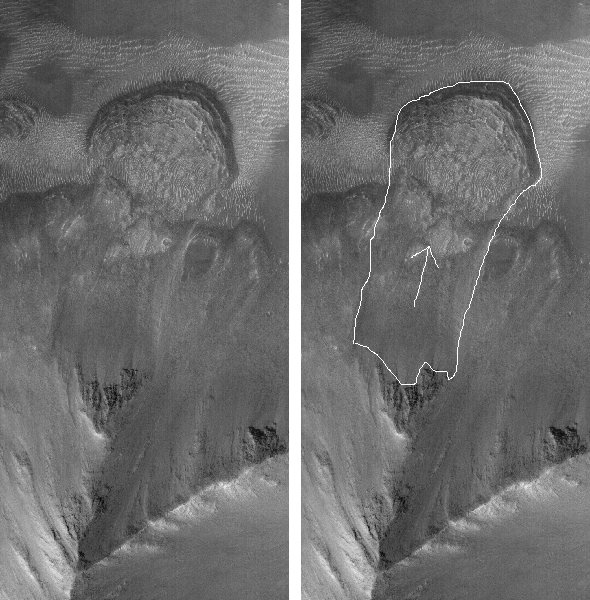
The original MSSS web page: Ophir Landslide - MGS MOC Release No. MOC2-1271, 4 November 2005

The original MSSS web page: Ophir Landslide - MGS MOC Release No. MOC2-1271, 4 November 2005
11.04.2005 06:29
bird flu virus - mac osx - no
I was told yesterday that someone
believed that a mac osx box had been infected with the bird flu
virus. I can find nothing on the web to say that the bird flu virus
can infect a Mac OSX box... nor any other virus. I have also
concluded that the mcafee virus database is really lame. Not much
in the way of useful information in there guys.
Please if anyone knows of a confirmed mac osx box infected with a virus, please let me know. I still believe in NOT putting things like Sofos and Norton AntiVirus on your mac. If you want, scan the machine with ClamAV once in a while... it may find viruses sitting in your email files, but those viruses won't do anything to your osx or linux machine (as far I know).
ClamAV - The free Anti Virus solution for Windows on Linux
Bird flu virus infects PCs [zdnet]
Please if anyone knows of a confirmed mac osx box infected with a virus, please let me know. I still believe in NOT putting things like Sofos and Norton AntiVirus on your mac. If you want, scan the machine with ClamAV once in a while... it may find viruses sitting in your email files, but those viruses won't do anything to your osx or linux machine (as far I know).
ClamAV - The free Anti Virus solution for Windows on Linux
fink install clamav clamscan --bell -r --log=~/Desktop/virus-scan.txt -i / less ~/Desktop/virus-scan.txt
Bird flu virus infects PCs [zdnet]
Attackers are exploiting fears over bird flu by releasing a computer virus attached to an e-mail passing itself off as containing avian flu information, warned computer firm Panda Software.
According to Panda, the virus Naiva.A masquerades as a word document with e-mail subject lines such as "Outbreak in North America" and "What is avian influenza (bird flu)?"
When the file is opened, the virus modifies, creates and delete files. A second part of the virus installs a program that allows hackers to gain remote control of infected computers.
11.03.2005 11:28
yahoo maps beta... much improved
Check out http://maps.yahoo.com/beta/index.php
... way better. You can now drag around the map, there are scale
bars, and there is a photoshop like navigation overlay
window.
pyinstant reminds me of inlining assembly in C, accept now it is inlining C in python. Can I inline assembly in C and then in Python?
pyinstant reminds me of inlining assembly in C, accept now it is inlining C in python. Can I inline assembly in C and then in Python?
11.02.2005 15:35
SQUIDs
Just so you paleomagnetists in the
crowd can readup about your magnetometers, here is the wikipedia entry on SQUIDs. I first tried
typing squid into the search field and only got the animal.
I would appreciate it if someone would invent a high temperature SQUID that has the better noise characteristics of the low temperature SQUIDs! That would probably reduce the cost of these magnetometers.
I would appreciate it if someone would invent a high temperature SQUID that has the better noise characteristics of the low temperature SQUIDs! That would probably reduce the cost of these magnetometers.
11.02.2005 13:50
pmag-kds-py 0.8
pmag-kds-py 0.8 is out...
- fabricsim.py: Added program to draw clay particle cartoons
- ams.py: F-test improvements... needs testing/validation
- units.py: Added deg2rad() and rad2deg()
11.02.2005 12:13
Sad moment for SGI fans (or ex-fans)
I though SGI's were the coolest
computers everywhere (from 1992-1999) then I started wondering why
I was spending so much money on the box and then on the support and
the OS started not working that well. They sold OpenInventor,
destroyed VRML, but my finally straw was the pathetic support of
open source software and software installation in general. "inst"
and the freeware CDs were horrible.
Still, the computers back when will live in my memory forever. How many hours did I spend in front of an IRIX box? My first Octane absolutely rocked!
So today, SGI got delisted from the stock exchange: SGI Delisted, Becomes Penny Stock
Too bad the whole IRIX deal from the kernel to inventor/explorer/performer wasn't opened up. Someday I am going to give one of the solaris bootable CD's a try... schillix or belenix. Just to see how they are doing. I have no intention of switching to Solaris!!!
Still, the computers back when will live in my memory forever. How many hours did I spend in front of an IRIX box? My first Octane absolutely rocked!
So today, SGI got delisted from the stock exchange: SGI Delisted, Becomes Penny Stock
Too bad the whole IRIX deal from the kernel to inventor/explorer/performer wasn't opened up. Someday I am going to give one of the solaris bootable CD's a try... schillix or belenix. Just to see how they are doing. I have no intention of switching to Solaris!!!
11.02.2005 11:20
Frustration with matplotlib
I though I had an awesome package in
matplotlib and have been hoping to start decreasing my useage of
gnuplot. Gnuplot is pretty rugged, but is starting to feel its age.
So why am I whining? I am currently working a little program to
make cartoons of clay sediment fabric. I'd like to make a cute
little figure to show what I see going on in my cores with
overpressure. This is similar to what Lisa Tauxe got Rodrigo
Coppelli do in his masters thesis. I really like what he did in
Figure 29. The program is coming along well and the figure looks
great on the screen. I decided it is time to put the figure in my
paper. I dumped the matplotlib figure to an svg and brought it up
in Illustrator like this:
I think I am also having issues with the randomness of random.random. I am using /dev/random for the seed, but that is not going to improve the non-randomness of the normal random functions. Suppose I could use one from GSL or just keep reading from /dev/random and pay a speed hit.
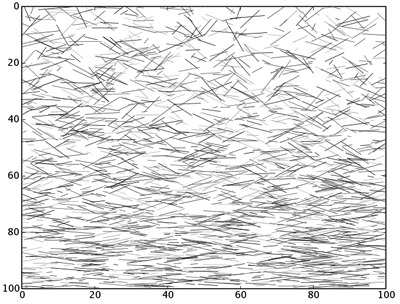
fabricsim.py --noisy --plot-file=fabric.svg \
--angular-dist=range_uniform \
--max-angle=80 --min-angle=7 \
--start=10 --end=30
open -a /Applications/Adobe\ Illustrator\ CS/Illustrator\ CS.app fabric.svg
It looks great. I am writing out a separate plot command for each
line. This has a terrible side effect. For each plot command, it
looks like there is a background box draw for the whole figure
size. It is transparent, but there are something like a thousand of
these things. OUCH! Guess I have to dump the lines to a gnuplot
format file and make an SVG from there. How do I write a whole
bunch of discreet lines in matplotlib with one plot command?I think I am also having issues with the randomness of random.random. I am using /dev/random for the seed, but that is not going to improve the non-randomness of the normal random functions. Suppose I could use one from GSL or just keep reading from /dev/random and pay a speed hit.

11.01.2005 19:17
python optparse choices
I came up with my own little way to
deal with optparse choice items. This lets me specify the choices
once and then make a list of options for the user. The for loop
builds a string that contains all the choices. I was surprised not
to see anything that already handled this in optparse. If it is
there, please someone tell me what it is!
densityChoices = ('linear','exp','const')
choicesStr = ''
for i in range(len(densityChoices)): choicesStr+=densityChoices[i]+', '
choicesStr=choicesStr[:-2]
myparser.add_option('--density-type',dest='densityType',
type='choice',choices=densityChoices,
default='linear',
help='What method to use to generate density '
+'[default: %default] [choices: '+choicesStr+']')
11.01.2005 10:36
New Santa Barbara Basin slide paper
There is a new paper out in Marine
Geology about the landslides in the Santa Barbara Basin area.
Geology and tsunamigenic potential of submarine landslides in Santa Barbara Channel, Southern California by Fisher, Normark, Greene, HJ Lee, and Sliter.
Geology and tsunamigenic potential of submarine landslides in Santa Barbara Channel, Southern California by Fisher, Normark, Greene, HJ Lee, and Sliter.
A large submarine landslide complex and four small landslides developed under the Santa Barbara Channel, suggesting a potential hazard from landslide-generated tsunamis. We integrate offshore stratigraphy and geologic structure, multibeam bathymetric information, and several kinds of seismic-reflection data to understand how and when the submarine landslides formed. Seismic-reflection data show that mass failure along the slope began at least 200 ka ago. Landslides appear as zones of poor reflectivity having an irregular upper surface, and these zones alternate vertically with strong parallel reflections. The emplacement ages of two of the three main landslide lobes are well established at 8 and 10 ka. The source material for the youngest part of the landslide complex was sediment of probable late Pleistocene and Holocene age that accumulated in a shelf-edge delta. Directly under this delta, growth of faults and anticlines was particularly intense and tended to oversteepen the deltaic deposits. These active structures also formed migration pathways and reservoirs for aqueous and hydrocarbon fluids from the deep basin. Tsunami deposits have been described from a low-lying area near Santa Barbara, and numerical modeling of tsunamis generated by hypothetical landslides in Santa Barbara Channel indicates a moderate to severe threat [Borrero, J.C., Dolan, J.F. and Synolakis, C.E., 2001. Tsunamis within the eastern Santa Barbara Channel. Geophys. Res. Lett., 28(4): 643-646.], involving wave runups of 2-20 m, for a range of assumed landslide volumes. Inundation from these waves, however, is expected to be highly focused so that only narrow (not, vert, similar10-km) sections of the shoreline would be affected.
11.01.2005 09:25
Possible nanoblogger bug
It seems that yesterday, I was unable
to get nanoblogger 3.1 to get a posting to show up in the archives.
Hopefully that was just a one day thing. So this is a test to make
sure that it is back in working order.
Well, all is working now and pardon the double article. I copied my 31st article to the 30th and now both are in the archive. Strange.
If I were to write a firefox plugin, my first one would be to enable C-k, C-a, and C-e emacs style shortcuts! Not having them is driving me crazy.
Well, all is working now and pardon the double article. I copied my 31st article to the 30th and now both are in the archive. Strange.
If I were to write a firefox plugin, my first one would be to enable C-k, C-a, and C-e emacs style shortcuts! Not having them is driving me crazy.
